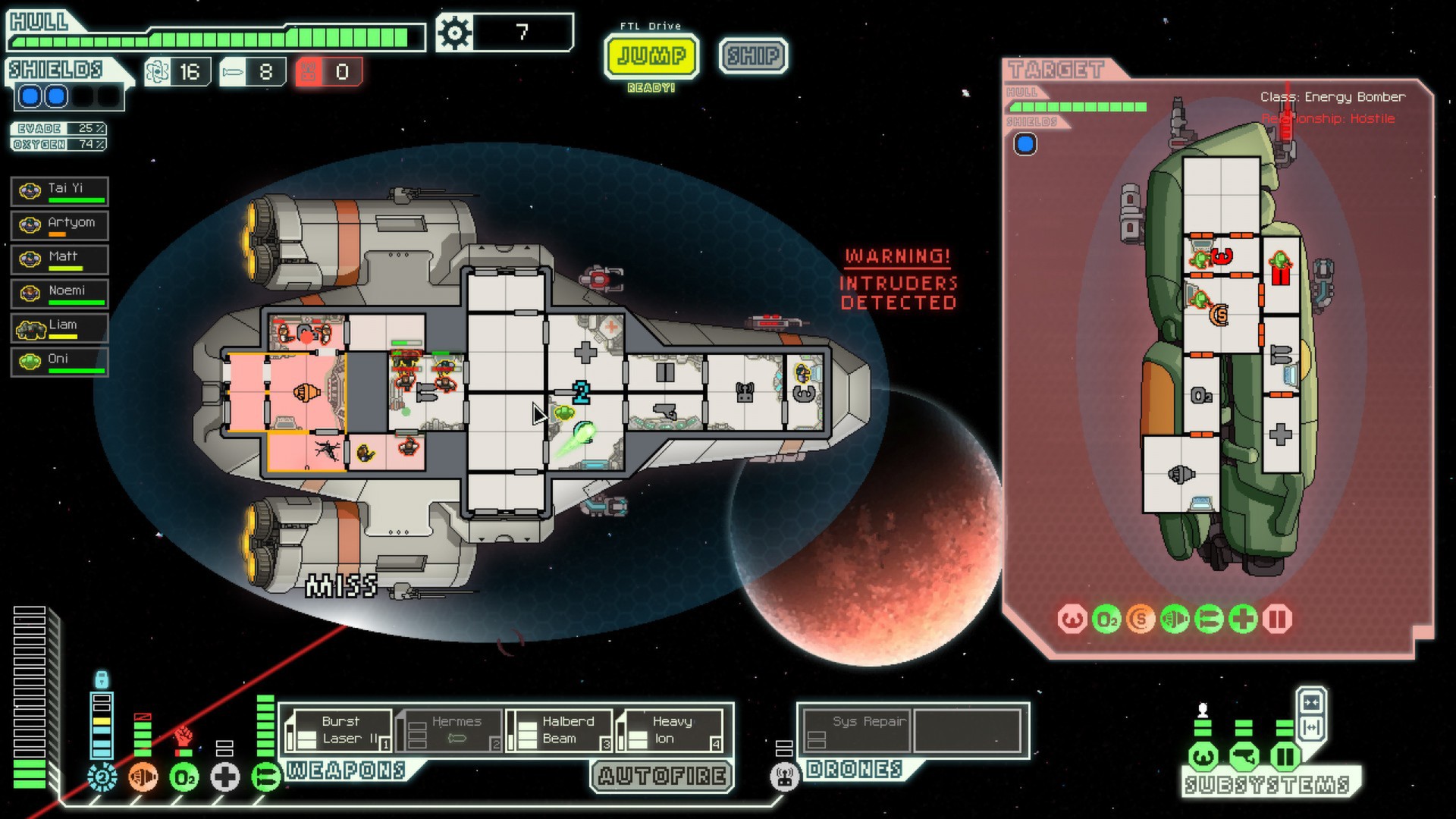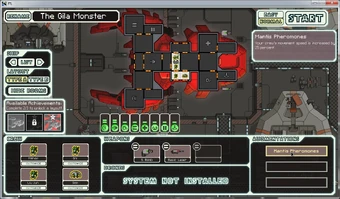Ftl System Slots
Slots: 4 Weapon, 2 Drone (requires system). Ftl System Slots also receive 50 free spins! Bonus doesn't work. T&C. Subscribe to our newsletter to.

- Download the working FTL - Faster than light trainer cheat for free here
- http://hackandgameparadize.com/2012/09/ftl-faster-than-light-trainer-50-pc-cheat-steam-megatrainer-godmode.html
- Below are the features of the FTL – Faster Than Light Trainer/Cheat/Hack;
- Trainer Options:
- Insert – Enable Trainer
- Numpad 1 – Unlimited/Infinite Health – GODMODE *INSANE HOT*
- Numpad 2 – Unlimited/Infinite Scrap*HOT*
- Numpad 3 – Unlimited/Infinite Missiles*HOT*
- Numpad 4 – Unlimited/Infinite Drone Parts*INSANE HOT*
- Numpad 5 – Unlimited/Infinite Oxygen *INSANE HOT*
- Numpad 6 – Unlimited/Infinite Energy*INSANE HOT*
- Numpad 7 – Hull Auto Repair*INSANE HOT*
- Numpad 8 – Low Enemy Hull *INSANE HOT*
- Numpad 9 – Shield Auto Repair *INSANE HOT*
- Numpad 0 – Low Enemy Shield *INSANE HOT*
- Numpad 0 – System Slot Auto Power
- F1 – ONE HIT KO *INSANE HOT*
- F2 – Add more power slot *INSANE HOT*
- F3 – Mega Weapon Recharge *INSANE HOT*
- F4 – Enemies Cant Attack *INSANE HOT*
- F5 – Healthy Crew
- Home – Disable ALL
- MORE FEATURES to be added. *STAY TUNED*
- Description of the FTL – Faster Than Light Trainer/Cheat/Hack;
- Insert – Enable Trainer
- Numpad 1 – Unlimited/Infinite Health – GODMODE ( your ship health generates at an insane rate)
- Numpad 2 – Unlimited/Infinite Scrap (press to add more can be done indefinitely)
- Numpad 3 – Unlimited/Infinite Missiles (press to add more can be done indefinitely)
- Numpad 4 – Unlimited/Infinite Drone Parts (press to add more can be done indefinitely)
- Numpad 5 – Unlimited/Infinite Oxygen (once activated – you have indefinite oxygen)
- Numpad 6 – Unlimited/Infinite Energy(once activated – you have indefinite energy)
- Numpad 7 – Hull Auto Repair(once activated – all your hulls will auto repair after fall below 50%)
- Numpad 8 – Low Enemy Hull (once activated – all your enemy hulls will be at low level)
- Numpad 9 – Shield Auto Repair (once activated – your shield will auto repair after fall below 50%)
- Numpad 0 – Low Enemy Shield (once activated – all your enemy shield will be at low level)
- Numpad 0 – System Slot Auto Power (once activated – your system slots will auto power after fall below 50%)
- F1 – ONE HIT KO (All enemy units will be killed with single hit regardless of their level, armor or defense skill)
- F2 - Add more power slot (press to add more can be done indefinitely)
- F3 – Mega Weapon Recharge (press to instantly recharge your mega weapon)
- F4 – Enemies Cant Attack (once activated – all enemy units will not be able to attack)
- F5 – Healthy Crew(once activated – all your crew will be at full health)
- Home – Disable ALL
- Contents
- Will my Linear Flash Card work in my operating system?
- PCMCIA Linear Flash PC Cards with Linux
- PCMCIA Linear Flash PC Cards with DOS and Windows 3.1X
- Windows Readers for PCMCIA Linear Flash PC Card Memory
- PCMCIA Linear Flash PC Cards with Windows 95
- PCMCIA Linear Flash PC Cards with Windows NT 3.51 and 4.0
- PCMCIA Linear Flash PC Cards with Windows 98
- PCMCIA Linear Flash PC Cards with Windows 98 SE
- PCMCIA Linear Flash PC Cards with Windows 2000
- Using PCMCIA Linear Flash PC Card Memory with Recent Windows Systems
- About Attribute (2K or 8K Attribute) in PCMCIA SRAM and Linear Flash PC Card Memory
- PCMCIA SRAM and Linear Flash PC Card Memory with Windows Server 2003
- PCMCIA SRAM and Linear Flash PC Card Memory with The Windows Vista
Will my Linear Flash Card work in my operating system?
Only if your operating system vendor provides drivers. Card readers and PCMCIA Linear Flash PC Cards do not come with drivers for PCMCIA Linear Flash PC Cards, it has always been the OS vendor's responsibility to include support or you will have to purchase a Card and Socket Services software package from a third party vendor.
PCMCIA Linear Flash PC Cards with Linux
Please see Linux PCMCIA HOWTO 4.7 PCMCIA memory cards.
Ftl System Slots Game
- PCMCIA Linear Flash
- Synchrotech Linear Flash
- See our extensive range of PCMCIA Linear Flash PC Cards
- Synchrotech offers AMD Series C, AMD Series C, Intel Series I, Intel Series II, and Intel Series II+. Other types are available for special order.
- Software Packages
- PCMCIA Memory PC Card Software
- PCMCIA Memory Card software for use with laptop slots or PCI based card readers
- Provide Windows with various degrees of support for PCMCIA SRAM and Linear Flash PC Cards
PCMCIA Linear Flash PC Cards with DOS and Windows 3.1X
For DOS and Windows 3.1X: PCMCIA Linear Flash PC Cards need a DOS version of a Card and Socket Services Program. Please check to see if you have this running, if not, contact your notebook PC vendor or card reader manufacturer. Some of the vendors listed or linked to on the PC Card support for MS Windows NT 4.0 page also make Card and Socket Services packages for other legacy Microsoft operating systems.
Windows Readers for PCMCIA Linear Flash PC Card Memory
OMNIDriveUSB Pro LF and OMNIDrive Pro are external read-writers for PCMCIA Linear Flash, SRAM, and ATA Flash PC Cards. Their specialized software package allow Windows users to access, view, manipulate and even copy via binary images, the data on PCMCIA Memory PC Cards. For built-in PC Card slots, see our software page.
- OMNIDriveUSB2 LF
- USB 2.0 to PC Card Read-Writer 1-Slot for ATA Flash + SRAM + Linear Flash (OMNIDriveUSB2 LF) (ART0020711)
- OMNIDriveUSB2 LF provides a specialized hardware/software bundle allowing Windows to work with PCMCIA SRAM, Linear Flash, and ATA Flash PC Cards. 32-bit 98/98SE/Millennium Edition/2000/XP/Server 2003/Vista/7, 64-bit XP/Vista/7
- PCM-CR-U2EX-LF Price: $519.00
- OMNIDrive Pro LF
- PCM-CR-P1EX3
- Parallel Port to PC Card Read-Writer 1 Slot + SRAM/Linear
- The PCM-CR-P1EX3 provides a specialized hardware/software bundle which allows Windows systems to work with PCMCIA SRAM, Linear Flash, and ATA Flash PC Cards
PCMCIA Linear Flash PC Cards with Windows 95
Ftl System Slots App
You may want to try these instructions from the 'Users of TrueFFS Flash File System for PCMCIA Cards' section of the Windows 95 CD-ROM Hardware.txt File. However, this is untested and unsupported by Synchrotech and is reproduced here as a service only.
Ftl System Slots Games
Users of TrueFFS Flash File System for PCMCIA Cards. The MS-DOS or Windows 3.1 versions of the TrueFFS driver will not work with the Windows 95 PCMCIA driver. To work with FTL formatted Linear Flash PCMCIA cards when the Windows 95 PCMCIA driver is enabled, you must install a new Windows 95 device driver provided by M-Systems. To do this, carry out the following procedure:
- In Control Panel, double-click the Add New Hardware icon.
- Click Next, and then click the option not to have Windows search for your new hardware.
- Click Hard Disk Controllers, and then click Next.
- From the list, click M-Systems.
- Click the specific Flash Card, and then click Next. Then follow the instructions on your screen.

NOTE: If M-Systems is not shown in the list, click Have Disk, and then insert the M-Systems Windows 95 installation disk and follow the instructions on your screen.
Otherwise, you may want to locate a Card and Socket Services software vendor for Windows 95. Some of the vendors listed or linked to on the PC Card support for MS Windows NT 4.0 page also make Card and Socket Services packages for other legacy Microsoft operating systems.
The following information may be of use with Windows 95:

PCMCIA Linear Flash PC Cards with Windows NT 3.51 and 4.0

For NT 3.51 and 4.0: You need a NT version of a Card and Socket Services software program on your system. Please contact your notebook PC vendor or card reader manufacturer. Please see our PC Card support for MS Windows NT 4.0 FAQ page for more information.
PCMCIA Linear Flash PC Cards with Windows 98
Ftl System Slots System
Use the drivers supply by Windows 98. These drivers are located in the following directory in the Windows 98 CDROM:
to install these drivers, do this:
- Remove all PCMCIA Linear Flash PC Cards from the PC Card socket
- Right click on driversstorageftltrueffs.inf This will create a directory in your windows directory called TFFS9X
- Once this directory is installed, all of the necessary drivers are installed.
- Add LASTDRIVE=Z statement on the CONFIG.SYS
- Restart your system
- Both slots are now PCMCIA Linear Flash PC Cards card compatible
The following information may be of use with Windows 98:
PCMCIA Linear Flash PC Cards with Windows 98 SE
The instructions above for Windows 98 should work with 98 Second Edition. However, this is untested and unsupported by Synchrotech and is reproduced here as a service only.
PCMCIA Linear Flash PC Cards with Windows Millennium
The MS-DOS or Windows 3.1 version of the TrueFFS driver does not work with the Windows Millennium PCMCIA driver. To work with FTL-formatted Linear Flash PCMCIA cards in Windows Millennium, install the device driver provided by M-Systems.
To install the device driver:
- In Windows Explorer, go to the DriversStorageFlash folder on your Windows Millennium CD.
- Right-click the file Trueffs.inf, and then click Install.
- Restart your computer.
Your PCMCIA Linear Flash PC Cards and SRAM cards will now function. For more information see Microsoft's Windows Millennium Edition Hardware.txt File page.
PCMCIA Linear Flash PC Cards with Windows 2000
Please see Windows 2000 Work Around for PC Card Linear Flash and SRAM. The best solution is an OMNIDrive either in USB or Parallel versions. See Windows Readers for PCMCIA Linear Flash and SRAM PC Card Memory for more information.
Using PCMCIA Linear Flash PC Card Memory with Recent Windows Systems
Please see Windows 2000/XP/Server 2003/Vista Solutions for PCMCIA SRAM and Linear Flash PC Cards.
About Attribute (2K or 8K Attribute) in PCMCIA SRAM and Linear Flash PC Card Memory
For devices that don't support the full Card Services standard, this CIS-like 2K or 8K storage tuple essentially informs the device what type of card has been inserted and in cases of storage cards, the capacity of the card. SRAM and Linear Flash are examples of cards that are available with or without a 2K or 8K Attribute. Types of devices that require attribute are usually lab equipment, embedded systems, PDAs and the like. For the most part, notebook computers support Card Services, and hence don't require attribute. When in question, check your device's documentation or contact you device manufacturer.